*SPIN helped curate the soundtrack to this film.
About a month and a half ago, a friend of mine I’ve known since seventh grade died unexpectedly. I immediately called our mutual friend, Bryan, to tell him the bad news, and we grieved together.
So, when I watched filmmaker Brian Brightly’s new independent film, The Wake, the experience hit me in a number of ways. The movie, about three middle-aged men mourning the loss of their friend, all captured on video by a young, female NYU student for her thesis project, is a statement on grief, to be sure. But what stayed with me for days afterward was its message about how older men deal with their emotions. That is to say, in general, we don’t.
The Wake, released on streaming August 5, is a very small, independent film, the kind that was prevalent in the ’90s but is much more of a rarity these days. Ryan Miller of the band Guster stars in his first feature role as Ethan, one member of a bereaved trio of friends, which also includes Rob Yang (The Americans) as Dan and Ross Partridge (Stranger Things) as Spencer. Michael Chernus—who’s best known for his role as author Ricken Hale, Mark Scout’s brother-in-law in Severance—stars as the deceased friend, Jack, and Julia Randall (Who We Were) is Rachel, the NYU student filming his friends.
In a candid interview, Brightly, producer Brad King, Miller, and Chernus discuss the making of the film, the pain of losing loved ones, and why older men often have a difficult time expressing their emotions.
Brian, what inspired you to make this film?
Brian Brightly: Ten years ago, I lost a best friend. And in a way, it’s a tribute to the bar as a church. It was the place where I got honest with my pals about everything. And the weird thing for me about someone you love dying, it really fractures you, the grief. You’re illuminated in all these ways you wouldn’t normally get to.
I was always a fan of naturalism in the 1970s. Husbands, I always referred to. Five Easy Pieces. Movies where you watch it and you’re like, oh, this is happening. It’s real. And for me, streamers have kind of lost that. They feel very disposable to me and fake. And so I was like, all right, this is the story that can be real if I can find the right performers. So that was the genesis for it.
I found The Wake relatable because I have a group of friends that I’ve known since we were kids. As I was watching it, I felt like, in a lot of ways, those characters were us.
BB: [John] Cassavetes said, “The most difficult thing in the world is to reveal yourself.” Cinema gives you a chance to do it, but I just don’t think it’s done that well anymore. And so, yeah, we were fortunate to sort of gather some actors who were really willing to go there.
Michael and Ryan, what made both of you interested in this film?
Michael Chernus: Ryan made me interested in it, which is a true story. So I’ll let him start.
Ryan Miller: This might be like the meme of the Spider-Men pointing at each other because Chernus sort of made me interested, too. I live in Vermont, and I know Brian sort of vaguely socially here. And he was like, “Hey, I got a script for you to read.” And he sent me the script and he was like, “What do you think of it?” And I was like, “This is great. Good job, dude. Go do it.” And he said, ‘Oh, do you want to star in it?” And I was like, “Ha!” And then he was like, “No, I’m serious.” And I’m like, “Okay, sure dude, I’ll star in your movie.” I didn’t really know him, you know? So I guess part of it was like, I didn’t think it was going to be a real thing. And then he was like, “I think your friend Michael would be great in this.” And I’m like, I don’t like to ask my famous friends to do things. So I sent Michael the script. I was like, “Look, I promised I would send this. We never have to talk about it again. I just need Brian to know that I sent it.”
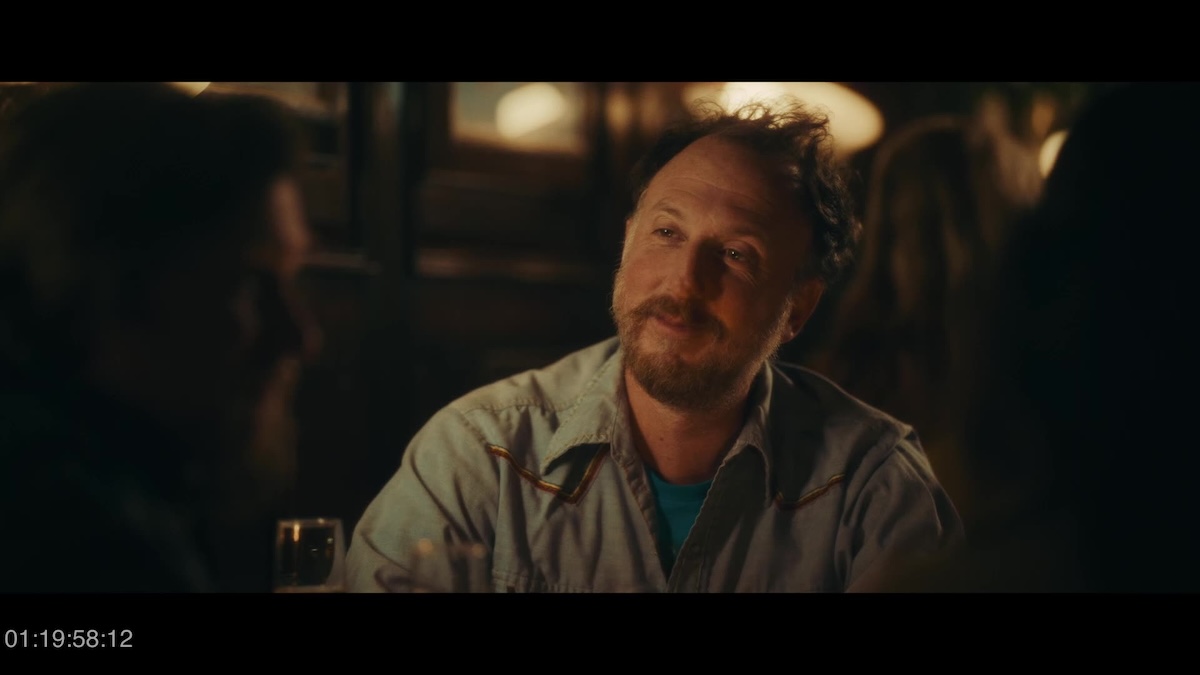
MC: It was 2023, so both the SAG strike and the WGA strike were happening. And my wife and I had a baby girl that year. I was at home being a new dad, our first child. And Ryan sent this script. And he did say, “I’m going to be acting in it, and we could act together.” And I was like, wait, what? That sounds incredible. So it took me a couple of weeks and I finally got back to Ryan and I was like, “I like it.” And it just so happened that Ryan and the director Brian were meeting in New York City with this actress, Julia Randall, who ended up being the lead in the movie. And so I wasn’t ready to commit to it, but I was like, “Can I tag along to that lunch and meet this mysterious Brian Brightly guy? Because I was like, Brian Brightly, that’s a made-up name…I might be getting into some situation where I’m drinking some poisoned Kool-Aid and dying.
RM: At least we die together, bro.
MC: Yeah. We die brightly. Ryan and I have known each other for 20 years, but we really deepened our friendship a few years prior. Neither of us lives in New York City anymore, and so every time Ryan is in New York City, I go meet him. And I was like, oh, he’s upping the ante here. This isn’t just like, “Do you think you could meet me in the city for dinner? This was like, “Will you shoot an indie movie with me in Syracuse?” And I was like, “Yeah, sure. Why not? For you? Anything.” I was like, if we’re going to have this movie about a pack of guy friends, it can’t just be you and me and then a bunch of strangers. And so I enlisted my casting director friend, Allison Estrin, and we got my dear friend Ross Partridge and Rob Yang. Allison did an incredible job casting it. And I think it’s a testament to the script and the story. I think you get to a certain age, and we’re not old yet, but we sure ain’t young. And people do start getting sick and passing away. I had a friend a couple of years ago at 49 drop dead of a heart attack, and we had played in a band together and were actors together. And you get to this point where you’re of middle age, and it’s cliché, but you start asking these questions of, “Who am I? What do I have left to accomplish? What matters anymore?” And so, winter in Syracuse with Ryan Miller felt like the right way to explore those themes.
I thought it was an interesting choice to have a college-aged woman be the window into these middle-aged guys’ lives. Brian, what made you decide on that perspective?
BB: Part of it was practical. The first draft of the script did not have her in it. And I read it and I thought, boy, I kind of love this, but I’m not so sure if it’s going to reach any females at all. What am I going to do about the females, the wives, in the story? I like movies that have an unreliable narrator, because it keeps you on the edge. And so once I thought about that point of view, then I was like, okay, then we get to take her journey as well. So it just worked for me that way. And when I met Julia Randall initially on Zoom, she was just so tough. I knew she’d be the one to stand up to those guys. And so she just was the right choice.
Brad King: I just remember Ryan saying, “God, she’s freaking scaring me.”
BB: She was gritty, man. And I will add, when my buddy died 10 years ago, everybody seemed confused and hurt, but it was the younger, the next generation, the kids, the sons and daughters, who were actually articulating what was going on in a way that the guys couldn’t. And so I brought that in through that lens. And it seemed to open up the movie and make it more.
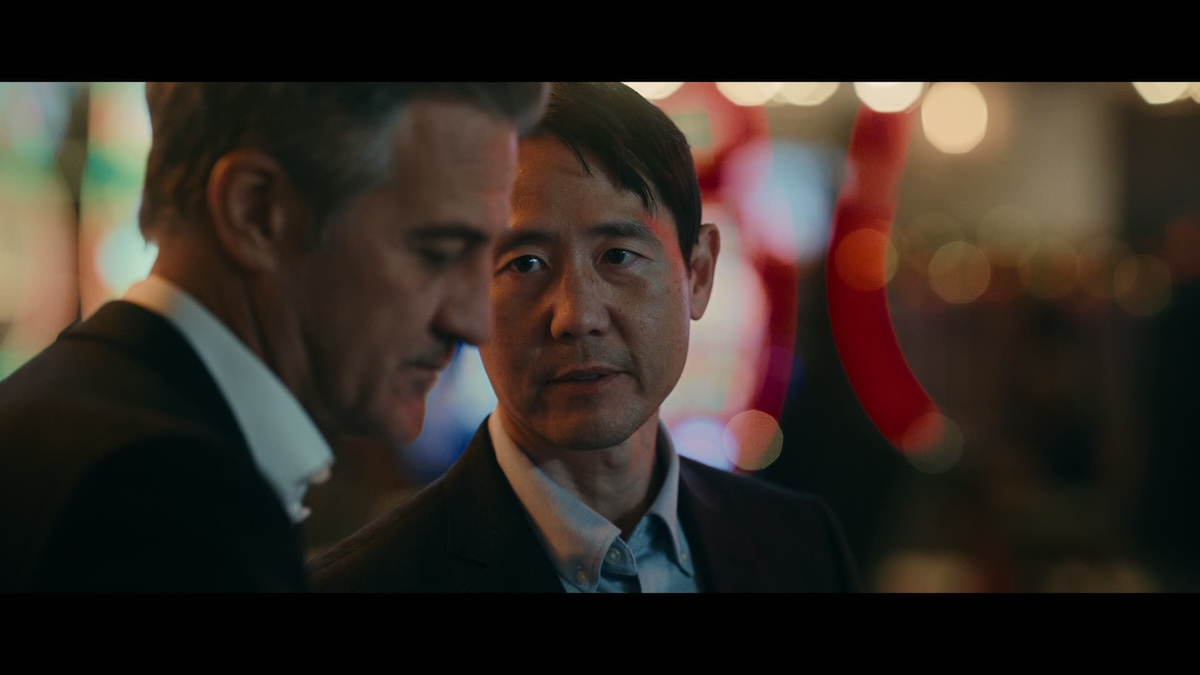
Julia’s character, Rachel, talks a lot in the film about telling the truth and being honest. I know that at least in my experience, sometimes it’s hard for men, especially older men, to be honest about their feelings.
BB: For sure. I think it’s kind of rare. Chernus brought a real spiritual depth and heart to it. And that affection and the fact that he is dead in the story, I think, was just a real antidote for everybody’s pain.
BK: When we went to Woodstock, Brian, a lot of women came up to us after that screening and said, “Thank you so much. This is finally a real film talking about real issues that we actually care about.” I’d never suspected that women would have that kind of reaction. Like, “This is real, and we need more guys to actually talk about this stuff because it helps us.”
BB: For sure. They’re the ones who understand and talk about it. Like, “Oh, finally I understand why I can’t get him to be honest with me.”
RM: I think in terms of the subject matter, the interior lives of these three dudes—not Jack because he seems to be the most grounded—but the three of us [Ethan, Dan, and Spencer] are kind of lost, and he was the ballast. And when he left, I think that’s what kind of sets us—just to keep the nautical theme moving—adrift in a way. He has the real relationship at home where the rest of us don’t. I’m not as much of a bastard as Ethan, but I do appreciate that a lot of people do have this dividing line between, especially as aging adult men, what they can access interiorly and what their lives are. It’s a very common thing and thankfully, I’m a little bit more in tune with that. It’s part of Michael’s and my relationship. Our relationship is a lot about us exploring our interior lives together and comparing notes and being like, “Is everything okay?” But it’s a different flavor. So I appreciate that there were different variations on that theme that these four men on screen were all dealing with in these different ways. And three of them were bastards, and get called on it.
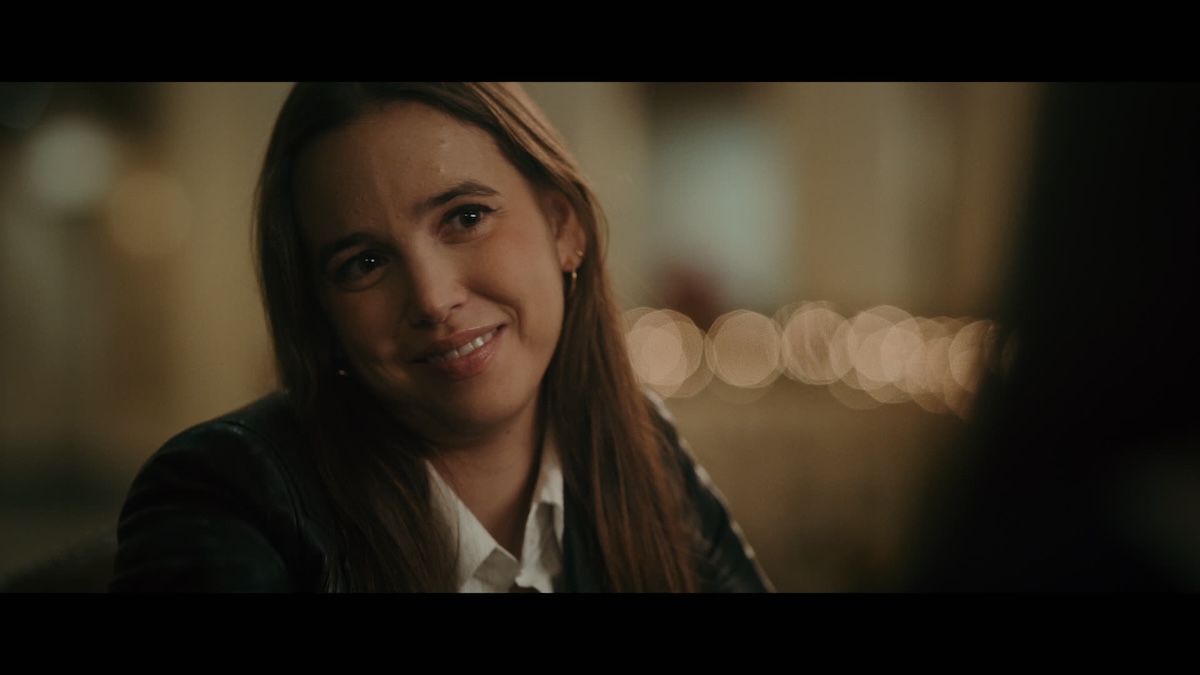
Without spoiling the movie, Julia’s character, Rachel, really threw me for a loop.
BB: I love that you said truth teller because I felt like all the guys were dishonest to a degree. And unresolved to a degree. And so even though she’s the one who may be blamed for making the mistake for [spoiler], she was actually the most honest of the crew. To me, her resolution was much more integrated, much more mature than the guys.
BK: There’s that one scene when they’re at dinner and she is about to leave and she says, “You haven’t taught me shit.”
BB: And he [Spencer] says, “You still have that one thing we’ve lost…hope.” Just to talk about Rachel for a second, I love in the hotel room, she’s trying to make sense of [spoiler], and she’s like, “Nothing is worse than lying. Why couldn’t you just be honest with me?” And I think this idea that it’s better to be honest and hurt some people than to lie for a lifetime, she was able to articulate that.
Watching the film, I couldn’t help but notice that this is a study on middle-aged men. None of the male characters seemed happy except for Jack. A lot of men in general aren’t happy for various reasons, and we’re expected to be stoic and strong and not talk about our feelings.
BK: It’s isolating, right? It’s interesting. My son just graduated from college and we went to this little dinner where guys from his fraternity spoke. They each individually took one guy and spoke about them. And we were like, “Oh my God, this is unbelievable. They’re talking about love.” And I personally, with my two sons, I’m going to hug them every day and I’m going to tell them I love them every day. I didn’t get that, so I’m going to do that for my sons. And you wonder whether it’s a generational component to what males have gone through. And maybe there’s an opening for that now.
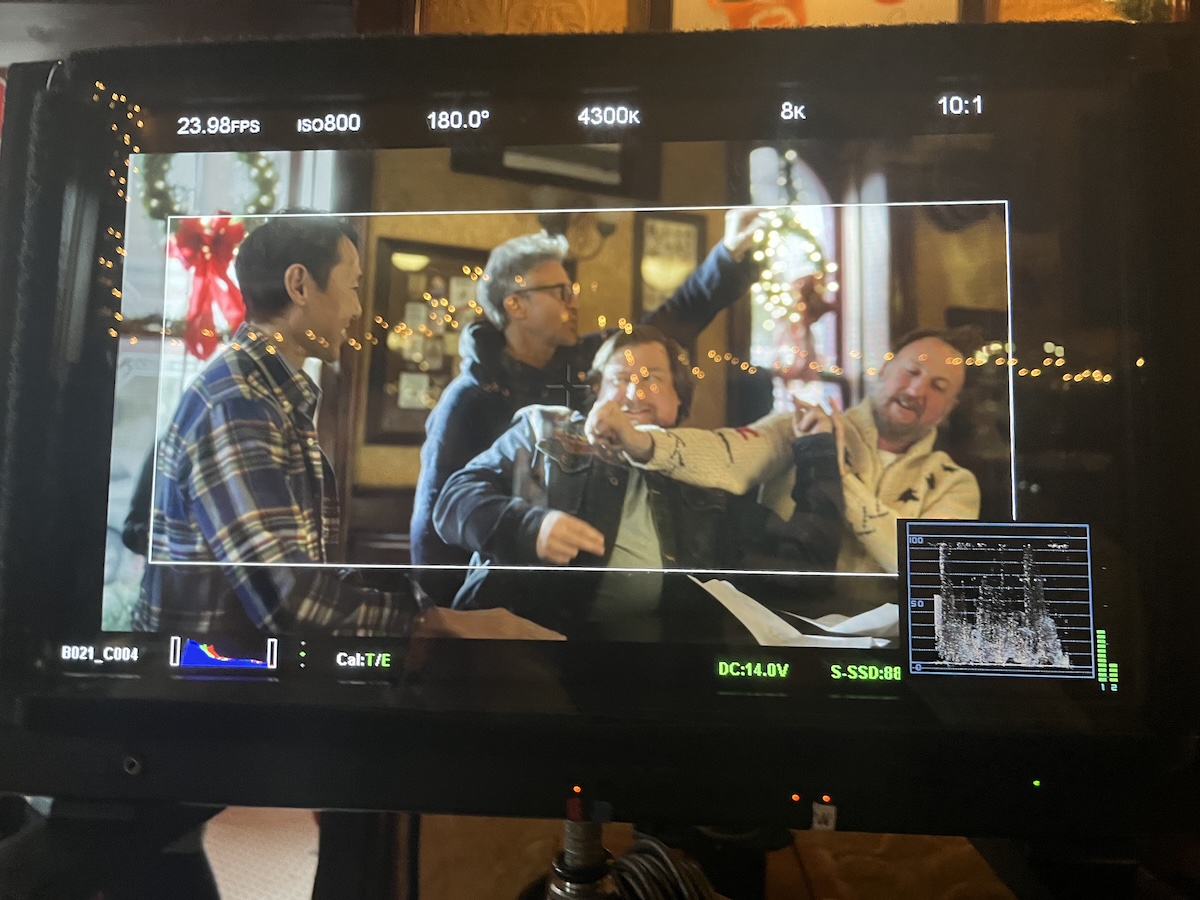
MC: There’s even that line where, Ethan, Ryan’s character, asks Jack at the bar, “Are you happy?” And I say, “Happy? Yeah, I’m happy. But mostly I’m grateful that I’m loved.” And I think we learn in the movie that Jack seems to be the most financially successful of the group, so that also affords a certain amount of comfort that maybe some of the other guys don’t have, especially Ethan. He’s sitting in a place of privilege. But I think he is at a place in his life where he just feels very grateful for everything that he has and that affords him a certain kind of happiness. But yeah, I think it’s an exploration of the discontent of these guys and their unrealized dreams. I also felt like in gathering this wolf pack of guys, it required artists and actors who were intelligent enough to understand that even though this is a movie about a group of guy friends, which we’ve seen in hundreds of other movies, it is also subtly talking about toxic masculinity and Julia’s character is filming us to make this documentary about how older guys just suck and it required that weird mix of actors who were charming enough that as an audience you were like, oh, I love them and they’re wonderful and I want to spend time with them.
One of the things I think the movie’s exploring is how complicated and confusing it is to be friends as men. Like what that means. We’re just taught, even still in 2025, to not be super vulnerable with each other. All of those masculine traits that we inherited from our dads and our dads’ dads and the bad [habits] that were passed down to us. What’s been internalized and that society reflects back to us is you’ve got to be strong and you’ve got to be stoic. So, how do men navigate moments of trauma or despair? Something like losing a best friend, how do these guys even know how to cope or talk? Their impulse is to go to Atlantic City and get fucked up and gamble.
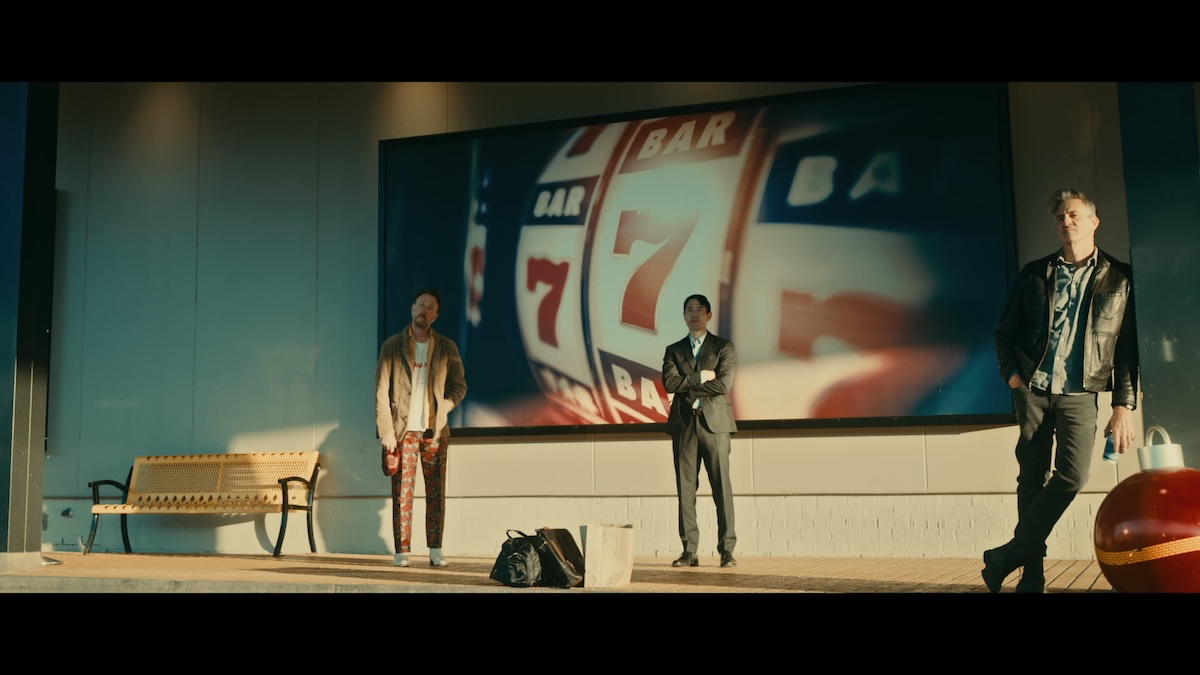
Ryan, talk to me about the process of writing the film’s score. I thought it was beautiful.
RM: I’ve been a film composer since Safety Not Guaranteed with Colin Trevorrow [in 2012]. I like to do a film a year. It’s just a great exercise. I love little sandboxes to play in. It’s a nice foil of being in a band and writing songs, where the sky’s the limit and kind of subsuming to somebody else’s vision. So, to be 100% honest, I’ve had a writing partner for my composing career for the last three or four years, a dude I went to college with, Jay Lifton. And we’ve done all our film scores together. And so when this came up, Brian had asked me after we had done the movie, “Do you want to score it? And I was like, “I don’t know that I can stare at my face for a month and a half.” I just was not confident in my performance, as you can imagine, having never done this [acting]. But I did. There’s a scene at the end of the movie where I’m playing guitar….and I was like, maybe I’ll write the theme of the movie here. So I had just sort of made up that chord progression and that melody in that last scene, and we used that as the basis for the score. So that sort of harmonic construction is sprinkled throughout. And so I gave that to Jay. And then to be perfectly honest, he did the rest of it. My name is on there mostly as just in generosity from Jay and for us to kind of keep our brand alive, because we’ve just done all our films together. And I was like, “Dude, you don’t need to put my name on the film. He was like, “Well, you wrote that thing. And we had talked about some of the stuff, and I had helped with a little bit of the orchestrations, but really it’s a Jay construction, and he went big. I mean, all the strings and all the horns in there were rerecorded. Everything’s real. Sometimes on these micro indies, you don’t have the budget for that kind of stuff. And he just pulled in a lot of favors and really wanted to make this very evocative score that felt authentic and felt bigger than it was. I can’t take a lot, or maybe almost any credit for this one. But it’s beautiful. It is some of my favorite work that Jay’s done, especially together.
BB: I was just thinking of Ryan’s [song] “Mind Kontrol.” The lyrics in his song talk about being in a dark hole and how to get out of it. And I think art still has the power to transform in a way that frees you of darkness. Whether it’s poetry or literature or a good movie, it’s really a rare chance to come to the well and refresh and restore and find some redemption.

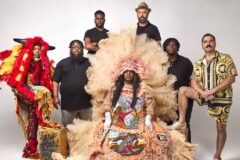
Leave a comment